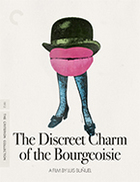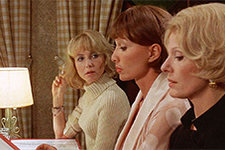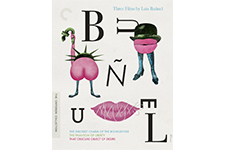| Director: Luis Buñuel | | Screenplay: Luis Buñuel and Jean-Claude Carrière | | Stars: Fernando Rey (Ambassador Raphael Acosta), Delphine Seyrig (Mme. Simone Thevenot), Stéphane Audran (Mme. Alice Senechal), Bulle Ogier (Florence), Jean-Pierre Cassel (M. Henri Senechal), Paul Frankeur (M. Francois Thevenot), Julien Bertheau (Bishop Dufour), Claude Pieplu (Colonel), Michel Piccoli (Home Secretary), Paul Muni (Peasant Girl), Milena Vukotic (Ines) | | MPAA Rating: PG | | Year of Release: 1972 | | Country: France |  |
|  Iconic Spanish director Luis Buñuel was 72 when he directed The Discreet Charm of the Bourgeoisie (Le charme discret de la bourgeoisie), which kicked off a final trimuverate of late-age masterful films that would provide a fitting coda for one of the titans European filmmaking, an artist who straddled surrealism, avant-garde, and art cinema across multiple continents for decades. Buñuel produced some of his best work after he turned 60, during which time he made a steady procession of provocative films that took satirical aim at high culture, the Catholic Church, and the military, all of which are skewered in one way or another in Discreet Charm. Although he is most often thought of as a surrealist, owing largely to his having established his filmmaking career in the midst of the bourgeoise-skewering ideologies spreading through Europe, particularly in Paris, where he made his home after leaving his native Spain in 1925 after studying philosophy at the University of Madrid and befriending the poet Federico García Lorca and Salvador Dalí, with whom he would collaborate on his first short film, the provocative surrealist masterpiece Un Chien Andalou (1929). However, Buñuel did not limit himself to surrealism. In fact, several of his films were made in the neorealistic style, and it is his experience with this aspect of filmmaking that makes his surrealism so . . . well, surreal. Buñuel’s gift is his ability to take the most absurd subject matter and film it with a completely straight face. It is farce draped in realism, and the results are as hilarious as they are willfully confounding. The set-up for The Discreet Charm of the Bourgeoisie is misleadingly simple: a group of six members of the upper class—François and Simone Thévenot (Paul Frankeur and Delphine Seyrig), Henri and Alice Sénéchal (Jean-Pierre Cassel and Stéphane Audran), Alice’s sister Florence (Bulle Ogier), and Don Rafael (Fernando Ray), the French ambassador to the non-existent South American country of Miranada—attempt to have dinner together. However, every time they sit down to eat, something gets in the way, and as the film progresses, these interruptions become stranger and stranger. For instance, the first time dinner is ruined because they got the time and date mixed up, and the hosts weren’t prepared. Simple and understandable. When they try to consummate the meal at a nearby restaurant, they are repulsed to find that the manager has recently died and his body is sitting in the next room. This is the first hint that something isn’t quite right. During the next few attempts, dinner is interrupted by an amusing sexual escapade that leads to a misunderstanding that the police are after them, a restaurant that has run out of every beverage except for water, and a group of military soldiers dropping by while conducting war exercises. It isn’t long before Buñuel drops all pretenses of reality and enters the characters’ dream-worlds. He never gives the audience any clue as to when he is shifting from waking reality to a dreamscape. And, really, in Buñuel’s cinematic work, is there a meaningful difference? As he put itin an interview published in Objects of Desire: Conversations With Luis Buñuel, “Dreams are a continuation of reality. In a film they are only valuable if you donm’t announce ‘this is a dream.’ Because then the viewer will say, ‘Ah this is a dream. Then it’s not important.’” The dream sequences are among the film’s most striking, especially one involving the characters sitting down to dinner and suddenly realizing they are on a stage. There is another rather creepy sequence in which a soldier recounts the story of how his mother’s ghost instructed him to poison the man who claimed to be his father. The Discreet Charm of the Bourgeoisie, which is both socially insightful and deliriously funny, is a crucial film for Buñuel’s career, as it marked a decided shift for him back to his roots in the non-rational logic of surrealism, a trajectory he would continue with his last two films, The Phantom of Liberty (1974 and That Obscure Object of Desire (1977), both of which were also shot by Discreet Charm cinematographer Edmond Richard, who had previously worked with Orson Welles on The Trial (1962), Chimes at Midnight (1966), and his unfinished Don Quixote project. Buñuel displays an old master’s flair along with a cunning understanding of the shifts in the cinematic terrain since he and Dalí slit the audience’s eye in Un Chien Andalou. By the early 1970s, he had had enough success under the umbrella of European art cinema that Discreet Charm won the Best Foreign Language Film Oscar and he and Jean-Claude Carrière’s screenplay was nominated for another. Its cultural pedigree gave Buñuel the clout to continue making well-produced films through the end of the decade, but he always remained the consummate outsider, producing films that skewering everything conventional bourgeiose society holds dear. | The Discreet Charm of the Bourgeoisie Blu-ray |  The Discreet Charm of the Bourgeoisie is available as part of The Criterion Collection’s “Three Films by Luis Buñuel” box set, which also includes The Phantom of Liberty (1974) and That Obscure Object of Desire (1977). The Discreet Charm of the Bourgeoisie is available as part of The Criterion Collection’s “Three Films by Luis Buñuel” box set, which also includes The Phantom of Liberty (1974) and That Obscure Object of Desire (1977). | | Aspect Ratio | 1.66:1 (all three films) | | Audio | French Linear PCM 1.0 monaural (all three films) | | Subtitles | English | | Supplements | The Castaway of Providence Street, a 1971 homage to Luis BuñuelSpeaking of Buñuel, a 2000 documentary on Buñuel’s life and workOnce Upon a Time: “The Discreet Charm of the Bourgeoisie”, a 2011 television program about the making of the filmInterviews from 2000 with screenwriter Jean-Claude CarrièreArchival interviews on all three films featuring Carrière; actors Stéphane Audran, Muni, Michel Piccoli, and Fernando Rey; and other key collaboratorsDocumentary from 1985 about producer Serge SilbermanAnalysis of The Phantom of Liberty from 2017 by film scholar Peter William EvansLady Doubles, a 2017 documentary featuring actors Carole Bouquet and Ángela MolinaPortrait of an Impatient Filmmaker, Luis Buñuel, a 2012 short documentaryExcerpts from Jacques de Baroncelli’s 1929 silent film La femme et le pantinAlternate English-dubbed soundtrack for That Obscure Object of DesireTrailersEssays by critic Adrian Martin and novelist and critic Gary Indiana, along with interviews with Buñuel by critics José de la Colina and Tomás Pérez Turrent | | Distributor | The Criterion Collection | | Release Date | January 5, 2021 | | | COMMENTS | | Criterion originally released all three of these films on DVD in the early 2000s, so it has been more than two decades since their original transfers. Each of the films in this three-disc set boasts a new, high-definition digital restoration, which has resulted in notably improved visual quality. All three films were transferred in high-definition from 35mm interpositives and their 35mm magnetic tracks. Compared to the DVDs, the images on these discs are brighter, sharper, and have better color and consistency, as well as demonstrably less signs of age and wear. All three films look great, with excellent detail and plenty of intact, visible grain. Some of the inconsistencies in the old DVDs, such as the notably increased graininess in the nighttime scenes in That Obscure Object of Desire, are less noticeable here. All three films feature their original monaural soundtracks in clean, Linear PCM transfers. That Obscure Object also includes an optional English-dubbed track. This set is, not surprisingly, absolutely bursting with supplementary material. Much of it has been ported over from the original Criterion DVD releases, but quite a bit of it is new, as well. On The Discreet Charm of the Bourgeoisie disc, we get a pair of outstanding documentaries from the original 2000 DVD: The first, El náufrago de la calle de Providencia (The Castaway on the Street of Providence), is a 24-minute documentary homage compiled by Arturo Ripstein and Rafael Castanedo, long-time friends of Buñuel’s with whom he used to drink martinis and have long talks while they were living in Mexico. The majority of the footage was filmed during these evening get-togethers in 1970, and the documentary is composed largely of Buñuel’s friends talking about him, as well as footage of Buñuel himself carefully making martinis, which to him was akin to a religious experience. The second documentary, A propósito de Buñuel (Speaking of Buñuel), is feature-length (it runs roughly 98 minutes). Directed by Jose Luis López-Linares and Javier Rioyo, it is an engaging examination of Buñuel’s entire career, from birth to death. It features on-camera interviews with several dozen people, including Buñuel’s two sons, many of his closest friends, and numerous actors and writers with whom he worked. The film will be interesting to both Buñuel novices and those who are familiar with his cinematic oeuvre, which spans 50 years and multiple countries. López-Linares and Rioyo follow Buñuel all over the world, from his initial collaborations with Spanish surrealists like Salvador Dalí, to his brief work at the Museum of Modern Art in Manhattan, to his extended career in Mexico (where he became a citizen), to his return to his native Spain. Although it does not cover in-depth every film Buñuel made (that would be quite a chore, considering that he directed 32 films), it does focus on Un Chien Andalou (1928), L’age d’or (1930), Las Hurdes (1932), Los olvidados (1950), Rehearsal for a Crime (1955), Virdiana (1961), The Exterminating Angel (1962), Simon of the Desert (1965), Tristana (1970), and That Obscure Object of Desire (1977). New to this edition is a 52-minute episode of the documentary series Once Upon a Time from 2011 that offers a deep dive into the film’s production and cultural history that includes interviews with screenwriter Jean-Claude Carriere, actors Stephane Audran and Bulle Ogier, and first assistant director Pierre Lary, among others. We also get “The Making of The Discreet Charm of the Bourgeoisie,” a 14-minute episode from 1972 of the French program Pour le cinéma that includes footage of Buñuel working on the set, as well as with interviews with him and actors Stephane Audran, Jean-Pierre Cassel, Bulle Ogier, Fernando Rey, and Delphine Seyrig. On The Phantom of Liberty disc, we get the same five-minute “introduction” to the film by co-screenwriter Jean-Claude Carrière, which is really an excerpt from a video interview recorded in 2000. He briefly discusses writing the script with Buñuel and what they were trying to accomplish (his favorite bit is the story about the parents looking for the lost child who is with them the whole time). Also included is “Analysis of The Phantom of Liberty,” a 20-minute visual essay from 2017 by film scholar Peter William Evans (author of The Films of Luis Buñuel: Subjectivity and Desire) that covers quite a bit of ground, with particular focus on Buñuel’s political, artistic, and cultural inspirations. We also get a 1974 episode of the French television series Pour le cinéma featuring Michel Piccoli and Jean-Claude Brialy; a 1974 episode of the French television series Le dernier des cinq that also features Brialy; and The Producers, a half-hour program from 1985 about producer Serge Silberman, who worked with Buñuel on five of his final seven films, including the three in this box set.. That Obscure Object of Desire’s disc is arguably the most loaded of the three. It ports over most of the supplements from the 2001 DVD, including an 18-minute video interview with Carrière, in which he discusses working with Buñuel, Buñuel’s directorial style, and the idea of using two actresses for the role of Conchita, among other things. We also get the inclusion of three scenes from Jacques de Baroncelli’s 1929 silent film version of La Femme et le pantin, the negatives for which were rediscovered in the 1990s. The three scenes—Conchita’s nude dance, her mocking Mathieu from behind the iron gate, and Mathieu’s violent attack on her the next day—correspond closely to scenes in Buñuel’s version (despite being a silent film, Baroncelli’s version is no less erotic or explicit in terms of nudity). Added to that, we get Lady Doubles, a 38-minute documentary from 2017 that includes interviews with Carole Bouquet and Ángela Molina, the two actresses who played Conchita; Portrait of an Impatient Filmmaker, Luis Buñuel, a 16-minute documentary from 2012 that includes interviews with cinematographer Edmond Richard and assistant director Pierre Lary, who recall their experiences collaborating with Buñuel on numerous projects; a 15-minute episode of the French television program Le monde du cinéma from 1977 featuring Carriére, Rey, and Silberman; “Remembering Buñuel”, a 30-minute episode of the French program Allons au cinéma from 1977 that documents a conversation among Carriére and actors Julien Bertheau, Muni, Michel Piccoli, and Fernando Rey about their experiences with Buñuel. All three discs includes original theatrical trailers, and the insert booklet features essays by critic Adrian Martin and novelist and critic Gary Indiana, along with interviews with Buñuel by critics José de la Colina and Tomás Pérez Turrent. All in all, this is a superb package that gives the films a fine presentation and is loaded with supplementary material. |
Copyright © 2021 James Kendrick Thoughts? E-mail James Kendrick All images copyright © The Criterion Collection |




 (3.5)
(3.5)

 The Discreet Charm of the Bourgeoisie is available as part of The Criterion Collection’s “Three Films by Luis Buñuel” box set, which also includes The Phantom of Liberty (1974) and That Obscure Object of Desire (1977).
The Discreet Charm of the Bourgeoisie is available as part of The Criterion Collection’s “Three Films by Luis Buñuel” box set, which also includes The Phantom of Liberty (1974) and That Obscure Object of Desire (1977). 